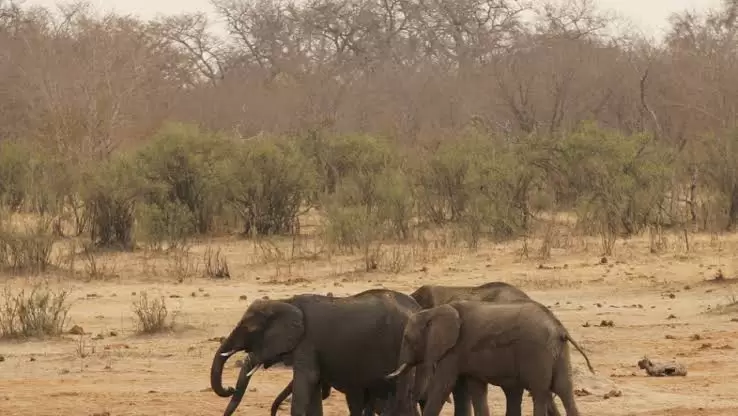

Last updated on September 11th, 2021 at 03:14 pm
Zimbabwe’s wildlife agency said on Monday it would move hundreds of elephants and other animals in a dramatic bid to save them from a lethal drought.
At least 120 elephants have already died over the past two months as the country grapples with one of the worst droughts in its history.
“We are moving 600 elephants, two prides of lion comprising between five and 10 members, a pack of wild dogs, 50 buffalo, 40 giraffes and 2 000 impalas,” parks and wildlife authority spokesperson Tinashe Farawo told AFP.
The animals will be moved from Save Conservancy, a major park in southeastern Zimbabwe, to three other game reserves.
“This will be the biggest translocation in our history,” said Farawo.
Permits for the operation have already been secured, Farawo said.
The transfer will start “during the rain season, when pastures and foliage start flourishing,” he added. The rain season usually kicks off from around the middle of November.
“We want to avoid a situation where we trans-locate animals, only for them to starve to death because there is no food in their new habitat,” he explained.
‘Human-and-animal conflict’
The relocation was announced after the death of dozens of elephants in Hwange, Zimbabwe’s biggest game reserve, located in the northwest of the country.
Hungry elephants have been breaking out of wildlife areas and raiding human settlements in search for food, posing a threat to communities.
Farawo said 200 people have died in “human-and-animal conflict” over the past five years.
Several southern African countries are in the grip of one of the worst droughts in decades, caused by months of above-average temperatures and erratic rainfall.
This year’s drought has wilted grasslands and dried up water holes, making it increasingly difficult for animals to survive.
Botswana last month announced that more than 100 elephants had died in two months in its famed Chobe National Park.
The drought has left more than five million rural Zimbabweans – nearly a third of the population – at risk of food shortages before the next harvest in 2020, the UN has warned.
Food shortages for people have been amplified by the combined effects of drought and the country’s enduring economic crisis.
South African President Cyril Ramaphosa defended his nation against claims of white discrimination made by tech magnate Elon Musk. After…
Hilton launched Signia by Hilton for its first appearance in Egypt and Africa through its hotel expansions. These hotels at…
UNICEF reported that, nearly 2900 people died of cholera across Eastern and Southern African countries while children suffer most greatly…
Enza, based in the United Arab Emirates, obtained $6.75 million in initial investment funding from Algebra Ventures and Quona Capital.…
US Secretary of State Marco Rubio ordered South African Ambassador Ebrahim Rasool to leave America by March 21 because he…
Early 2025 ends with IPL fever in India and cricket fans receive good news of an international schedule full of…
This website uses cookies.